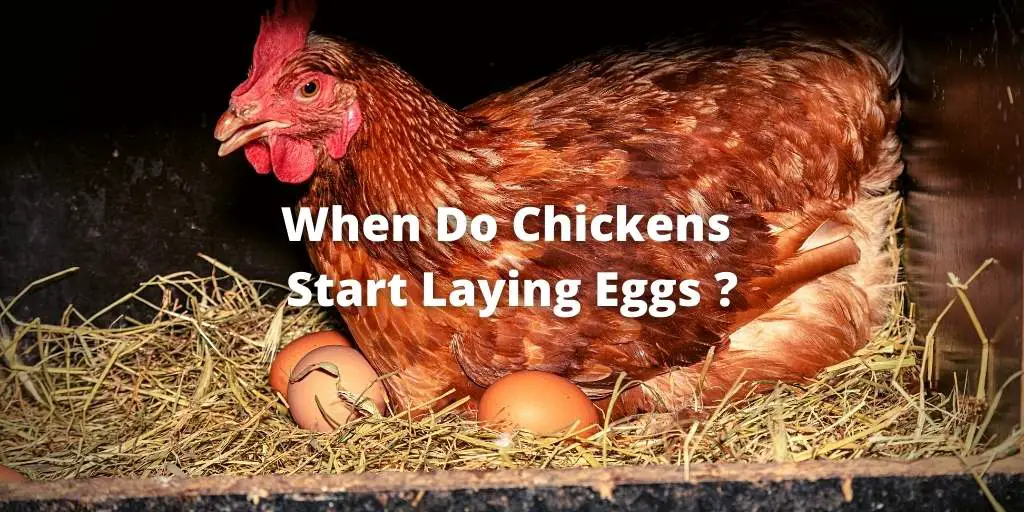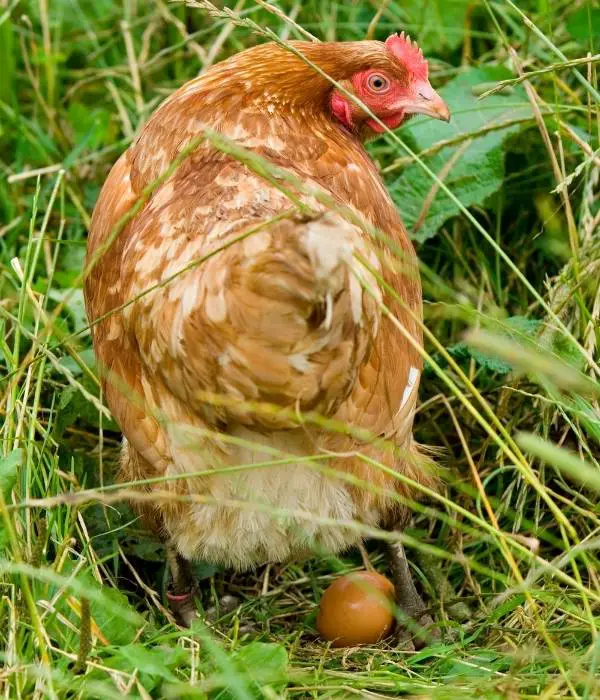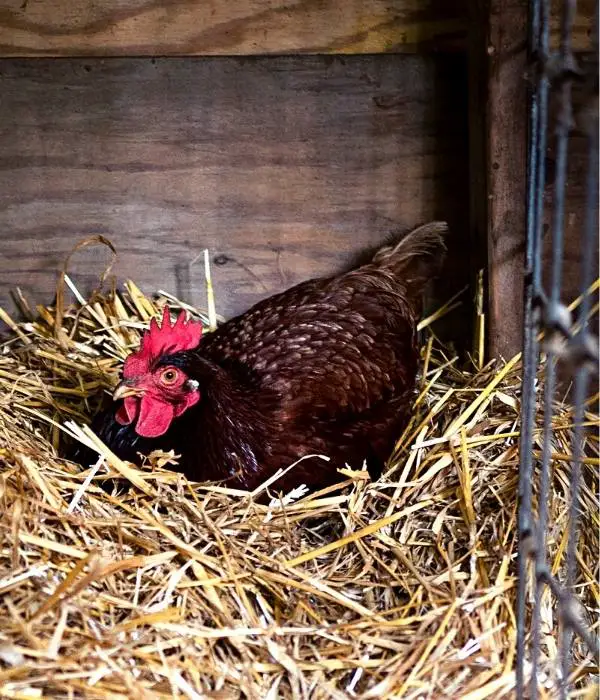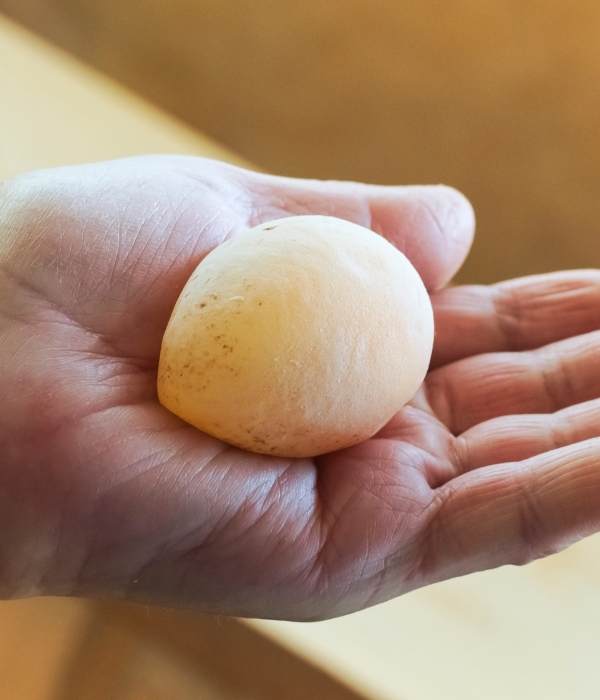
When do chickens start laying eggs? It’s a common question for most newbie chicken raisers who want to know the signs that their chicken will lay her first egg.
Every new chicken farmer waits for the first egg from their hens. Getting the first egg in the nesting box is one of the happiest days for every chicken raiser.
Chickens are unique and resourceful creatures, whether you keep them as pets or for small commercial use.
In this ultimate guide, you will learn about the signs, symptoms, and faqs of chicken egg laying.
When Do Chickens Start Laying Eggs?
Most hens start laying eggs after 4-5 months of age. Hens do not need roosters to lay eggs. Roosters only fertilize their eggs for further breeding.
Those of us who keep chickens for our eggs sometimes encounter various challenges to the extent of wondering whether we have the right chicken breed.
Also read: Best egg-laying chicken breeds
At What Age Do Chickens Start Laying Eggs

Your chicken’s breed plays a significant role in determining the age at which your chicken starts laying eggs.
Generally, when the chickens are fed well, have the right weight, and have no illness, they will start laying eggs between 16 and 18 weeks.
A healthy free-range chicken, for example, will lay one egg per day until it cannot do so any longer, whereas conventionally raised chickens can lay up to two eggs per day.
How Often Does a Chicken Lay Eggs?
Nutrition, weather, environment, and day length can affect how your chickens will lay eggs. A hen will regularly lay one egg a day when there is no illness, she is well-fed, and there is good weather.
To enable your chickens to keep producing, let them receive more than 12 hours of daylight. The chicken’s reproductive cycle takes 24 to 27 hours to successfully produce a mature egg for free-range breeds.
It does not mean that the cycle is in sync, as the hen can lay the egg at a different time each day. Different seasons affect how often your chickens lay eggs.
For instance, at the start of the winter season, the chickens are likely to reduce the frequency of laying eggs, and as the season progresses, they may stop altogether.
Also read: Hen Vs. Rooster Comparison
Chicken Behavior Before Laying First Egg (Know The Signs)

Chicken owners tend to be antsy when waiting for their hens to lay their first eggs. It is imperative to consider the factors that might affect when your chickens start laying eggs.
Nonetheless, you can see a few common chicken behaviors before laying her first egg.
Below are some of the signs and symptoms that tell you that your chickens are ready to lay eggs:
Chicken Getting Louder
Roosters are known as the loudest when compared to hens, but if you notice, hens become louder and sometimes make annoying noises and songs. This is a sign they are ready to lay eggs.
The hen will spend hours squawking until the moment it lays an egg. The noise usually differs from any other hen chatter during daily activities around your home.
Be prepared to start collecting eggs when you notice this behavior in the morning. Sometimes, in the evening, coop noises and broody growls. This is a sign that your chickens are ready to start laying eggs.
Hen Assuming Squatting Position
The squatting position indicates that your chickens are about to start laying eggs. This action indirectly signals to the rooster that the pullet has now grown into a mature hen that it can mount.
When the chicken squats, especially when the rooster gets near, it indicates that the hen is ready. If you notice this behavior in your chickens, you can expect them to start laying eggs.
Darker and Enlarged Wattles and Combs
Combs are the red parts you see on the top of the hen. On the other hand, wattles are the meaty parts hanging below the beak. Young chickens have whitish or pale combs and wattles.
The combs and wattles change colors as they age, becoming darker and eventually red. If you see this change in hens, not roosters, there is a high chance the chickens are about to start laying eggs.
Eating More
Similar to how humans experience numerous changes in different phases of physical development, so do chickens when getting ready to start laying eggs.
As they grow, the chicken eats more to sustain their developmental needs, but when they are about to begin laying, their eating habits change, and they eat more than you can hardly fail to notice unless they are free-range chickens.
This is because the chickens need more energy to make an egg. Once you notice this behavior, you can buy layer feed for your chickens to meet their nutritional needs.
Also read: Best vitamins and mineral supplements for chickens
Inspecting the Nest Boxes
When there is little to no interest in nesting boxes when the chicks are young, one notices some interest developing when they are getting ready. Hens start becoming interested in the nest boxes when they are about to start laying eggs.
The hens will start roaming around the boxes until they get a comfy one. If you see this behavior with your chickens, you can start expecting the first egg from the hens.
The more time the hen spends in its preferred nesting box, the more you should anticipate that first egg.
Separation of Bones in the Hen’s Pelvis
Unlike the other signs you only need to observe, you must physically inspect the chicken to determine its readiness to lay eggs. To do this, cradle the hen between your hand and arm and hold its feet to keep them from kicking you.
At the rear end of the hen is the pelvis. Feel the bones to establish whether they are separated or together.
The chicken is not yet ready to lay eggs if they are stuck together. However, if you notice the pelvis bones are separated, your hen is ready to start laying eggs.
Chickens Getting to the Egg-Laying Age
Typically, chickens start to lay eggs at 5 or 6 months. Some breeds will start laying early because of other factors such as feeding, illness, and season.
However, when your hens are of this age (5-6 months), one can expect eggs at any time. Ensure you create a clean and safe place for the chickens to use when they want to start laying eggs.
Keep the nesting boxes away from getting too much dirt, which can negatively impact the hens’ laying process. Hens need a relaxed and clean space to lay eggs.
When Do Chickens Lay Eggs Day or Night?
The hen requires a lot of energy to produce and lay eggs, so they require enough rest daily. This is why chickens sleep at night to gather all the strength they need for the day to come.
Hens lay eggs during the day, but there is no particular time. If the chicken has a ready-developed egg at night, it will not wake up to lay the egg until morning.
Remember, one cannot rush nature as it has its own timeline for things, which also applies to chickens.
When Do Chickens Stop Laying Eggs?
Typically, healthy chickens can live up to 8 and 10 years. When it comes to egg-laying chickens, they can lay eggs until they are 7 years old. Some stop laying eggs at age five, but this depends on the breed of the hen.
As the chicken ages, the egg-laying frequency decreases mainly because of aging. The chicken lacks enough energy to make eggs, mainly because of age, and at this time, the chicken may lay eggs twice a week or once a month and later stop laying eggs.
Also read: Washing Eggs: Why and How to Clean Eggs?
How Much Do Chickens Lay Eggs?
Well-producing hens lay about 250 eggs yearly, and it would be more if the hens did not take a natural break annually for molting. In one hen’s lifetime, it produces 600 eggs before it retires.
This includes the years when the hen will lay one to two eggs a week or completely nothing at all. The hen can occasionally surprise you with an egg, but not regularly.
Why Are My Chickens Laying Thin and Soft-Shelled Eggs?

Soft-shelled eggs are likely laid by young hens starting their egg-laying journey. It is not customary for the older hens to experience this as they are mature enough to produce a full-grown egg.
There are reasons why your chicken lays soft-shelled eggs, and they are:
Calcium Deficiency
Checking your hens’ calcium intake is vital for their egg production to be complete. If the hen takes less than the required calcium, it will produce thin and soft-shelled eggs.
As the chicken owner, one should incorporate calcium supplements into the hen’s feeds. One should strive to keep the hen healthy at all times.
Stress
Stress is a variable that can contribute to your chicken laying soft-shelled eggs. Stress can be due to the environment provided to them, bullying from others, too much stress, or overwhelming roosters.
It is always good to watch your laying chickens to know if they are at peace and calm.
Illnesses
If you are doing right by your hens and still notice the eggs are thin and have soft shells, it might be because they are sick. The hen could be suffering from the infectious bronchitis virus or bumblefoot, a virus.
If you notice other symptoms in your chickens, such as swollen heads or sneezing, act quickly and contact the vet to have them checked. After they get treatment, one is supposed to notice a change in the thickness and strength of the eggshells.
Detailed Guide: Chickens Laying Soft Shell Eggs? Reasons, Treatment & FAQs
Can Chicken Breed Cause Egg-laying Behavior, Symptoms, And Age?
There are various chicken breeds that farmers and other individuals keep for their egg production needs. The signs your chicken is going to lay egg differ from breed to breed.
Here are different breeds of chicken and how their egg-laying behaviors, symptoms, and ages differ:
Easter Egger Chickens
The chickens, weighing about 3 to 6 lbs, are small in appearance and friendly. This breed of chicken can sit on one’s lap without feeling threatened. These chickens can lay eggs at 20 to 25 weeks of age.
The chicken produces medium-sized, green, blue, or olive eggs. The hen can lay approximately 200 eggs annually, a good number, and starts its egg-laying journey when it is about six months old.
Araucana Chicken
For this breed of chicken, as long as one handles the hen regularly, the hen will grow to be the friendliest and most hostile if one does not. At around 20 to 25 weeks, the chicken can start laying eggs.
The egg that this hen produces has a blue outer shell that is adorable to look at. For older Araucana chickens, the eggs are a lighter blue, unlike when the chicken is ready to lay eggs. The hen can lay 150 to 200 eggs per year.
Rhode Island Red Chicken
If one is an inexperienced breeder, this is the chicken for you, as they can survive in difficult conditions. When the chicken is about 16 to 18 weeks of age, expect them to start producing eggs.
Even in extreme conditions, these chickens can endure and produce hard-shelled eggs. This chicken can lay 200-250 eggs yearly without an adequate diet.
Barred Plymouth Rock Chickens
The Barred Plymouth Rock chicken is mellow and friendly around all people, even strangers. Their calm nature allows them to keep the peace, and you do not have to worry about them fighting amongst themselves.
The hen can start laying eggs when 18 to 20 weeks of age. Barred Plymouth Rock breeds lay large eggs. This chicken can lay between 280 to 300 eggs a year.
Summary
Animal products are a superb energy source, mainly because they are not processed. Chickens are an excellent source of white meat; their eggs provide us with almost all the proteins our bodies need.
However, poor poultry farming can lead to discouragement because chickens need special care and understanding to be productive. I hope you got their answer to the question: When do chickens start laying eggs?


Leave a Reply